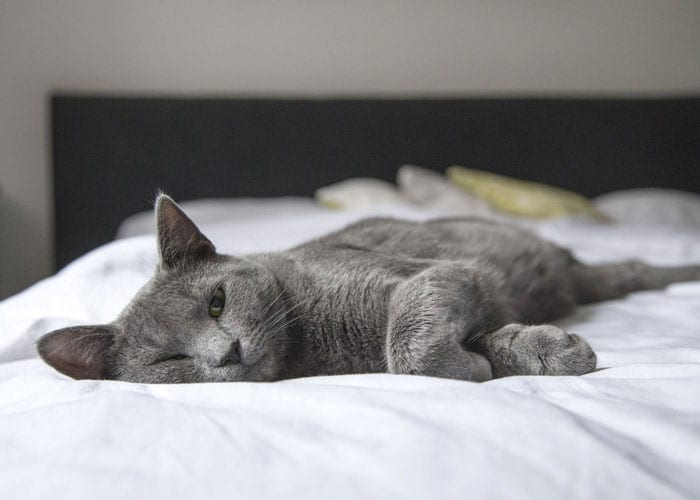Essential oils have never been as popular as they are today. From aromatherapy to cleaning to skincare and traditional medicine, they find uses in myriad applications.
They are fragrant, natural, and quite effective in treating joint pain, repelling bugs, making the home smell good, flavoring food, and easing stress.
Sadly, they can pose a serious risk to pets. These oils are so high in concentration that cats and other pets find them overbearing.
Sandalwood is one popular essential oil in most homes.
Trust it to treat mental disorders, digestive ailments, the common cold, hemorrhoids, scabies, urinary tract infections, and as a perfume.
Studies done on the oil show that it possesses potent anti-inflammatory, anti-bacterial, and anti-anxiety properties. It can also support wound healing and protect against cancer.
But what about its use around cats? Is it safe or not?
What Is Sandalwood?

Sandalwood essential oil is extracted from the bark of true varieties of the sandalwood tree.
The evergreen softwood is native to Indonesia and India and grows as high as 12m.
It consists of small flowers with short stalks and its bark is smooth and brown in color.
The wood has a natural woody odor and is often harvested for use in cosmetics, soaps, perfumes, and burning incense.
Both the roots and bark of the tree contain yellowish aromatic oil known as sandalwood oil. It is extracted from the bark using steam distillation.
Is Sandalwood Safe For Cats?

Both the Pet Poison Helpline and the ASPCA haven’t listed sandalwood as a hazardous product for pets.
Additionally, no reputable veterinary or pet website claims that it is unsafe for felines.
It is, therefore, safe to assume that cats can tolerate sandalwood oil.
If Wikipedia is anything to go by, sandalwood oil consists of 90% sesquiterpene alcohols. Out of these, 50-60% are santalols.
Well, the actual chemical composition is determined by the species of tree used, age, and region where the tree is planted. The harvest season and details surrounding the extraction also matter.
According to Pet Poison Helpline, some of the components that cats find hard to metabolize include phenols, phenolic compounds, and d-limonenes. The last one is found in citrus fruits such as oranges and lemons.
Fortunately, sandalwood oil doesn’t contain any of these toxic compounds.
Santalols actually have cancer-preventive properties as have been shown in this study. Alpha-santalol can be used to arrest specific cancer cells via apoptosis.
The component also resulted in a decrease in inflammatory markers in skin tissue models.
Although these results are based on human beings, cats can heavily benefit from them too.
A Word of Caution
Essential oils, in general, aren’t considered to be friendly around cats. This is according to this article on the ASPCA website.
Cats are very sensitive to these highly concentrated compounds. At 100% concentration, any essential oil can potentially harm your cat.
This is especially true if the oil touches any part of the pet’s skin or finds its way to the gut through ingestion.
Some of the dangers associated with essential oils for cats include the following:
1. Processing Challenges
A large majority of essential oils contain compounds that cats have no way of digesting.
We have mentioned things like phenols and phenolic compounds above. When they go through a cat’s skin or get ingested, they damage a cat’s major organs including the liver.
2. Sensitive Smells
You probably know that cats have some of the most sensitive noses in the pet world.
When compared to humans, their noses are 14 times stronger than ours. That means that anything that has a mild scent to you is quite intense to your kitty.
If it is too strong for you, it is overwhelming and irritating to your cat.
Why put them through powerful scents if you can avoid it altogether?
3. Respiratory Issues
Not all cats have respiratory illnesses but some do. In case yours is one of them, just keep any essential oil away from your kitty.
You never know when it will be too much for her and when it will cause severe symptoms.
Respiratory illnesses include asthma, FVR, and FCV.
Safety Tips

The thing with essential oils is that their effects matter from one cat to another.
If you are lucky, your kitty will handle it quite well. The opposite is also true.
If you insist on using sandalwood for your cat, adhere to the following safety precautions:
- Speak To Your Vet: Your vet should be able to tell you whether using sandalwood is okay for your cat or not. If they already have your pet’s medical history, that is a major plus for you. Whatever they tell you, don’t disobey.
- Diffuse Rather Than Applying: Diffusion is ideally a better option for using essential oils than application and ingestion. The former dilutes the oil and releases small particles into the air. Most cats can handle the aroma. While you are at it, keep your windows open. In case the cat feels overwhelmed, it can escape outside for some fresh air.
- Watch Out For Symptoms Of Poisoning: Things can go south when using sandalwood around your cat. Monitor your cat and report to the vet if you notice vomiting, diarrhea, tremors, lethargy, wobbliness, low heart rate, respiratory illness, drooling, and low body temperature.
Parting Thoughts
Aromatic, versatile, and effective, sandalwood essential oil is a useful product at home.
It doesn’t have any toxic components making it relatively safe to be around cats as well.
However, like all essential oils, it can pose a threat if used wrongly.
Stick to the safety tips above and stop using it if you sense something is amiss.
Which other essential oil isn’t safe around your kitty? Find out from the following posts:

Hi! I am Eleanor Price. I started this website after my cat, Louie, almost died from a case of botulism (a type of food poisoning often caused by bacteria that grow on food items). Turned out that my cat’s diet was the problem. I have made it my duty to provide the best information and recommendations about everything cat lovers need to know about their felines’ health and wellbeing. My goal is to find the most informative content on anything feline-related and share it with fellow hardworking kitty lovers.

